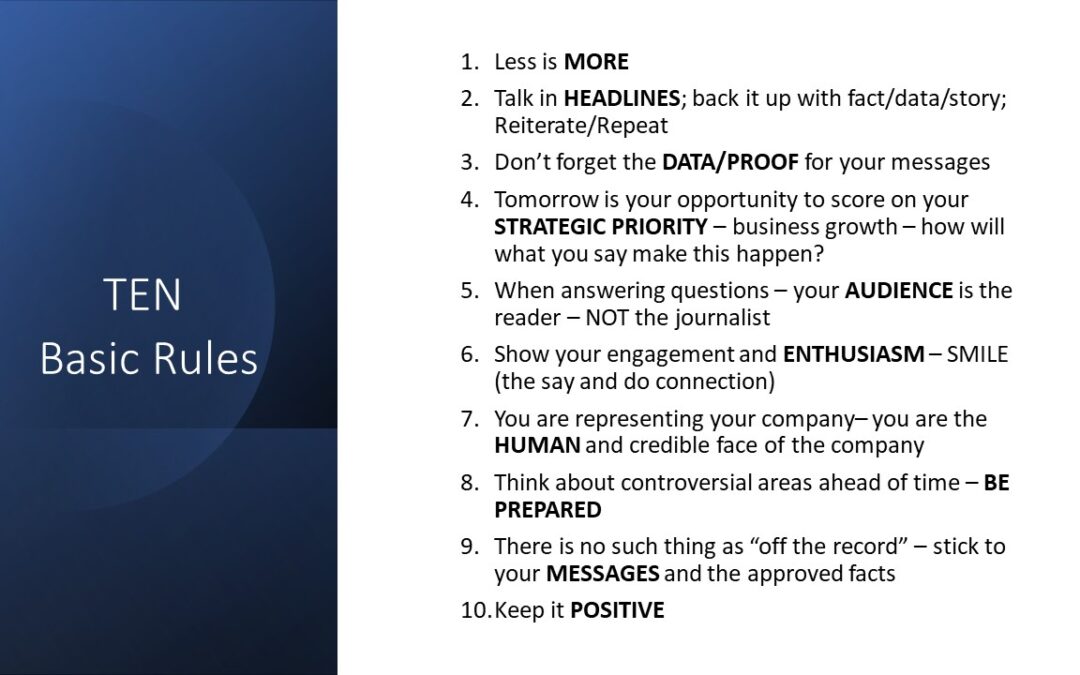For their companies’ sake and for that of the journalists too…. So at least use our TEN rules of media interviewing…please…
Too often, lack of time in the run-up to a big show is cited as the reason why many leaders, company reps and others fail to prepare themselves for media interviews at trade shows. Within this initial response are often more complicated, yet still false reasons for preparing for media interviews:
- “I’m good at talking with the media”
- “I know this company inside-out”
- “There won’t be many journalists wanting interviews”
- “I’m there to talk to our customers”
So let’s look at each of these in turn:
1. “I’m good at talking with the media”
That may be, but has the person considered that the objective of interviewing is not to talk to the journalist – but in fact to talk to his/her readers? This is not like any normal chat. The art of answering a question by delivering your key messages, supporting it with proof and concluding – all within a short space of time and words, is not a very normal conversational skill. Very often this is overlooked – one of our favourite recommendations to our clients is: “your company is paying for this interview in terms of your time – say what your company wants you to say, not necessarily what the journalist is asking.
2. “I know this company inside-out”
Apart from being over-confident and naïve as trade media journalists know their subject very well, too much knowledge is dangerous. Dangerous in that your answers are not succinct and clear and certainly not limited to the key messages. In all our trainings with clients, those that have joined a company recently or moved departments are more often the most effective at sticking to the message and delivering succinct answers to media questions. Why? Because they are not distracted by trying to download a 20-year career into a single answer.
3. “There won’t be many journalists wanting interviews”
Well true – this depends on the company, its products and if it has engaged in a media relations campaign beforehand. In preparing for a trade show happening only this week, we’ve found that the majority of journalists, known and new to our contacts, simply don’t want to commit to an interview time and date and prefer to wander the show, read the information. Our general rule is that for every 1 scheduled interview, we will have at least 2 “walk-on’s” – unannounced, media visitors to the stand. The proactive company that sees media interviews as an ‘opportunity’ will accept this and more so, capitalize on the chance to talk to customers afar.
4. “I’m there to talk to our customers”
Well, of course! But for every customer or potential customer that visits your stand, there are thousands reading the news online and in trade magazines. Media is called such because it is a medium… a bridge to your target audience. Companies that receive the most attention to their stand and its contents are those that engage with the media, provide clear information – written and spoken in interviews. It seems a waste to spend all that money on a stand, staff attendance and travel, if you don’t use the ‘newsy’ element of this to get some positive coverage in the news – news that your customers not at the show will be reading… and if not your news, then certainly your competitors’.
So where does this all lead to? Media training should be a central part of any pre-trade show preparations – just as important as the stand design itself! In our experience, these trainings can and should be tailor-made to the situation. They can be full-on 3 hour in-person training sessions, with a camera, play-back and critique and they can, on the other end of the scale, be simple video conference refresher sessions or supplementary video Q&A sessions to refine and rehearse the spokespersons’ skills.
Failing to prepare for media interviews with the appropriate level of media training, as part of an media relations and marketing plan, leaves many ‘Opportunities Missed’ that often your competitor has not ignored. Be prepared – journalists with little time at trade shows are grateful for succinct, factual and focused interviews!

